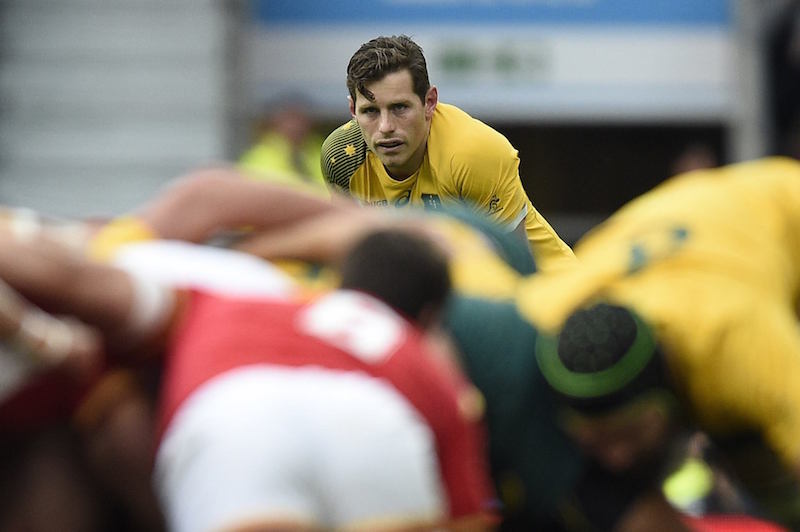Scheduled Website Maintenance
We’re currently in the process of moving to a new and improved server environment. During this transition, the website may experience brief interruptions or temporary outages.
We appreciate your patience while we complete this upgrade. Service will return to normal shortly, with improved performance and reliability.
Thank you for your understanding.
The choke tackle and blitz defence used by Wales last Saturday nearly saw the Wallabies finish runners-up in Pool A, where they would have faced a potentially more challenging play-off path. Ex-Wallaby player and England attack coach, Brian Smith, lets GAGR’s Richard Edwards know what the Wallabies can learn from this encounter.
On-track but still vulnerable
“The Wallaby performances in the cup so far, whist very impressive, have not been perfect. One area that needs urgent attention is how they can avoid or counter the choke tackle and blitz defence.
Wales executed both defensive tactics with great effect last weekend and have highlighted a recurring vulnerability in camp Wallaby that could well be exploited by opposition teams in the coming week(s).
In the last world cup, Ireland strangled Australia out of their pool game with choke tackles that resulted in several turnovers.
Scotland would have noticed how the Wallabies struggled again in this area last Saturday. And if we end up meeting Ireland in the semi-final, you can be certain the Wallabies will need to come up with some answers, as the boys from the Emerald Isle are the masters in this area.”
Choke tackles strangle attack
“For those not familiar with the term, a choke tackle should not be interpreted too literally. Although sometimes it can look like the player on the receiving end is having breathing difficulties.
It’s where a ball-runner is double (even triple) teamed by the defence, who prevent the attacker from going to ground or releasing the ball. When executed effectively, it results in a turnover, with a scrum feed awarded to the defending team.
It’s a play that leverages the ‘use it or lose it’ rules by creating an unplayable maul and it can stifle teams like the Wallabies that like to play a more expansive game.”
Chokes can be prevented
“There are a few things an attacking team can do to prevent being choke-tackled. You need to ensure you don’t have one-out runners in attack, because whenever the defence can double team you, they can choke you. You need to:
- force the defence into one-on-one tackles
- use little tip-off passes
- have good footwork
- go to the line with a variety of runners and lots of ball movement to limit their ability to double team you, and
- have a good ‘pick and go’ game, because it puts the defence on the back foot.
The thing about choke tackling is that you can only do it when you are on the front foot. You can’t do it when you are going backwards.
Also (as the Genia clip illustrates) you become a sitting duck if you get isolated and your support doesn’t reach you quick enough.”
Wales blitzed us to great effect
“The other way that Wales were able to shut down the Wallaby’s attack was by using a blitz defence.
This is where players in the defending team rush up and apply lots of pressure by shutting down the attacking team’s time and space.
Wales caught us on the hop a few times last Saturday, especially in the first half.”
The blitz can be negated
“One way to unsettle a blitz defence and take away some of the line speed is to put in some short kicks. It can make the defensive team think twice about rushing up if they’ve been turned around by a good kicking game.
Many teams have had good success against the blitz by kicking early.
Like the choke tackle, a pick and go game can help to flatten the defensive line.
Another thing that can really hurt a blitz defence is to play a ‘keep going’ pattern because if you can recycle quick ball, the defence has then got to reset, get their width and try and blitz again.
If you play a really fast game, you can shorten the defensive line quickly and create a lot of space on the edges.
Lastly, when you send the ball to a man out the back, they have to have a support runner, typically on the inside. Otherwise they are picked off too easily.
There was a classic example of that mid-way through the first half. Jamie Roberts rushed up and picked off Tevita Kuridrani.
Had Kuridrani had a player closer in support, he would have been able to offload under less pressure and the choke tackle that followed may have been avoided.
Australia will have looked at that and other plays closely and worked out what they need to do to address it.
The Wallabies are a versatile side that just needs to iron out a couple of cracks.

